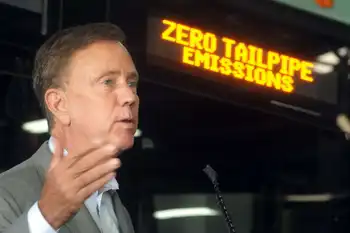Canadian groups appeal dismissal of Kyoto suits
VANCOUVER, BRITISH COLUMBIA - Canadian environmental groups appealed a judgeÂ’s decision to throw out three lawsuits accusing the federal government of failing to draft a plan to meet pollution-reduction goals.
“If the federal court’s decision was left unchallenged, Canada’s woeful inaction on the climate change crisis would be allowed to continue despite domestic law that clearly states the government must act,” Hugh Wilkins, a Canada Ecojustice lawyer, said in a statement. “We simply cannot stand by while the government picks and chooses which laws to enforce.”
Ecojustice and Friends of the Earth sued the government in 2007 and asked a judge to order Prime Minister Stephen Harper to comply with a June law requiring it to prepare a plan to meet the emissions targets of the Kyoto Protocol. The law passed with the support of opposition parties, which held a majority of the votes in Parliament.
John Baird, then environment minister, said in April 2007 that Canada couldnÂ’t meet its commitments under the Kyoto Protocol without causing a recession. According to an economic- impact report presented by Baird, implementing the Kyoto plan would result in 275,000 job losses in 2009 while the cost of electricity would rise 50 percent after 2010 and gas prices would increase 60 percent.
Friends of the Earth and Ecojustice sued the government in May 2007, alleging it had contravened the Canadian Environmental Protection Act by not meeting international commitments to reduce polluting emissions. The groups withdrew that suit after the June law was passed and filed three new complaints in September 2007.
Federal Judge Robert Barnes in Vancouver dismissed the lawsuits October 20, saying an order would be “meaningless” because the government can’t be forced to implement the policy. Barnes also said he doesn’t believe the court has a role to play in reviewing the reasonableness of the government’s response to Canada’s Kyoto commitments.
Canada is required by 2012 to reduce polluting emissions to 6 percent below 1990 levels under the Kyoto Protocol, the 1997 international agreement to reduce emissions of greenhouse gases that most scientists say contribute to global warming.
Under the governmentÂ’s plan, emissions would be reduced to a level 30 percent higher than the Kyoto targets. Baird said the proposal would put the country on track for further reductions later.
The case is Between Friends of the Earth and Her Majesty the Queen, T-1683-07, Federal Court of Canada.
Related News

CT leads New England charge to overhaul electricity market structure
HARTFORD - Weeks after initiating a broad overhaul of utility regulation within its borders, Connecticut has recruited four New England states to rework the regional grid that is overseen by ISO New England, the independent system operator charged with ensuring a reliable supply of electricity from power plants.
In a written statement Thursday morning, Gov. Ned Lamont said the current structure “has actively hindered” states’ efforts to phase out polluting power plants in favor of renewable sources like wind turbines and solar panels, while increasing costs “to fix market design failures” in his words. Lamont’s energy policy chief Katie Dykes has…




